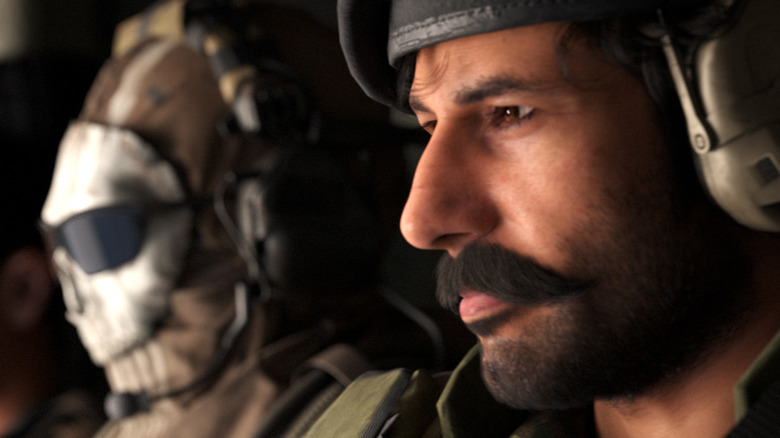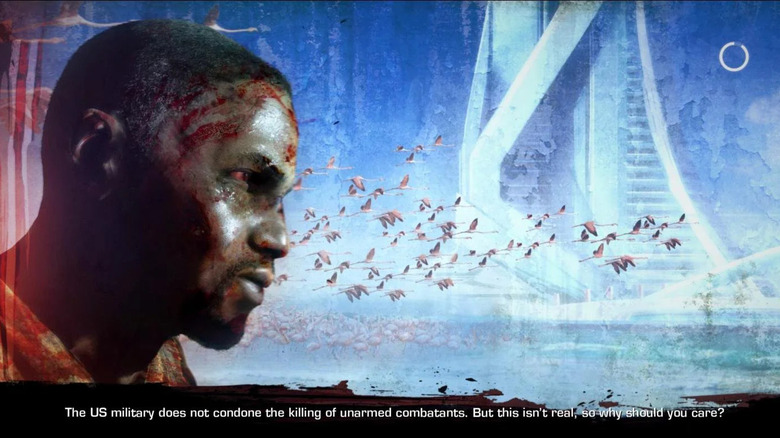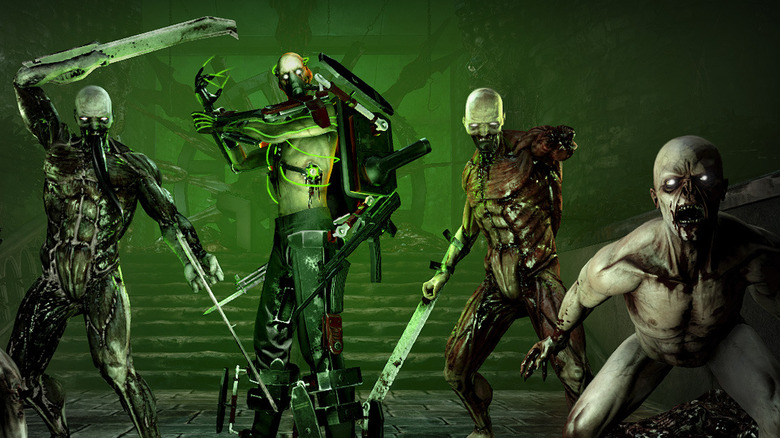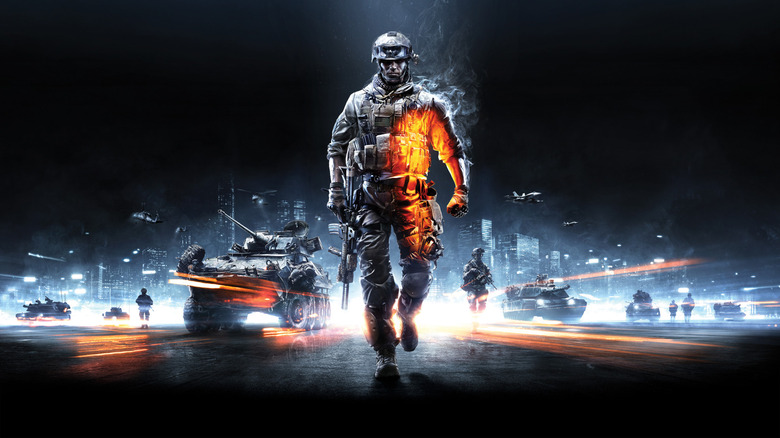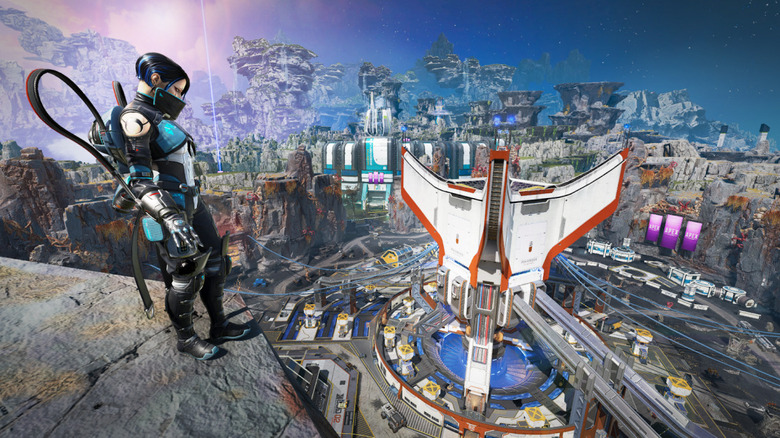Call Of Duty Clones That Are Actually Great
Not many first-person shooters can claim the same level of worldwide fame and recognition that the "Call of Duty" games have garnered over the years. The FPS genre really kicked off in the 1990s with games like "DOOM," which played a major role in the popularization of this new perspective. In 2003, the first "Call of Duty" game came out — it was developed by Infinity Ward, which still works on the series' modern iterations, but was a fledgling developer at the time, founded just the year before.
To say that "Call of Duty" is the world's biggest FPS series is no understatement — in fact, its inclusion on PlayStation consoles in the future has been a central part of the discussions surrounding the Microsoft and Activision Blizzard merger. But all that popularity inevitably leads to some copycats.
Now, the term "Call of Duty" clone can be taken a number of different ways, and it's kind of ironic because the original "Call of Duty" stood on the shoulders of giants like "Unreal Tournament" and "Quake.'" Nevertheless, the franchise's long-term success has inspired other games, some more directly than others. Some of these "Call of Duty" clones aren't exactly ripoffs, they're more like criticisms of "Call of Duty" as a series, like "Duty Calls" or "Spec Ops: The Line." Others are pretty obviously inspired by the mechanics and game modes of "Call of Duty" — though calling them a "clone" might be a stretch.
Duty Calls pokes fun at Call of Duty: Modern Warfare and the series' game design
There aren't many games that are made specifically to roast another, but "Duty Calls" does exactly that. Avid "Call of Duty" fans know this one from around a decade ago and, more than any other, can be accurately described as a "Call of Duty" clone. That's because "Duty Calls" is a ridiculous comedy game that takes about 10 to 20 minutes to complete, and one that tears down the stripped-down shooter formula that the "Call of Duty" series is known for.
In "Duty Calls," players are greeted with parodies right from the start screen as the narrator makes a mockery of the "War Never Changes" intro from "Fallout 3." The game takes players on an extremely constricted path through a parody of the "Call of Duty: Modern Warfare" tutorial where every enemy loudly shouts "I AM AN ENEMY" after jumping out of hiding. To describe more would be to ruin this hilarious experience, but, rest assured, it only gets better over its short runtime.
"Duty Calls" was originally made to advertise "Bulletstorm," a no-holds-barred sensory overload of a shooter that aimed to be everything "Call of Duty" was not. "Duty Calls" is still playable today, though it must be admitted that the "Call of Duty" series isn't quite as bad as the game portrays it nowadays. But roasting aside, there are other legitimate complaints that many have with "Call of Duty," particularly surroundings its glorified depictions of real-life warfare. The next title, "Spec Ops: The Line," offers something a bit more real.
Spec Ops: The Line criticizes Call of Duty's fetishization of warfare and takes a realistic approach
Where "Call of Duty" works with the U.S. military, "Spec Ops: The Line" criticizes it. "Spec Ops: The Line" development was rocky, but what players got was nonetheless one of the most profound experiences in gaming, certainly in the FPS genre. On the surface, "Spec Ops: The Line" looks like a "Call of Duty" clone through and through, but after delving into its singleplayer story, things get a lot less inspired and a lot more critical.
Without spoiling the major beats of the game, "Spec Ops: The Line" is a shooter that asks its players to consider its depictions of violence as something more, rather than just pixels and polygons on a screen. Everything from its narrative to the basic gameplay mechanics of shooting a gun was designed with this criticism in mind — even the loading screens make players think. It's all in the effort of making players realize the disconnect between real-life violence and video game violence, and to come to this realization while going through its emotionally grueling campaign.
"Spec Ops: The Line" isn't one for the faint of heart, but it has an important message to tell, and it's worth getting through that temporary pain to understand what the creators are trying to say about war. For those who glorify the military without ever seeing combat and without any real idea of what war is, its message might be even more important.
Killing Floor 2 is a perfect alternative to Call of Duty's Zombies mode
To call "Killing Floor 2" a "Call of Duty" clone is definitely a bit of a stretch, but it's not necessarily incorrect — though it might be better to say "alternative" than "clone." One of the most popular parts of the "Call of Duty" series is its zombies mode, which sees players survive as many waves of the undead as they can in a variety of settings. It's been a mainstay of the series since it was first introduced with "Call of Duty: World at War," but the formula can definitely get a bit stale after a while. This is where "Killing Floor 2" comes in.
To avid players, "Killing Floor 2" is essentially a total upgrade to the "Call of Duty" zombie game modes in all facets, but going into it for the first time can be very daunting. It's much faster paced, there's much more enemy and weapon variety, and, in almost all ways, the game is much more complicated than any of the "Call of Duty" zombies iterations. But that is the sticking thing: Its complexity and fast pace can scare some players.
"Killing Floor 2" doesn't necessarily copy anything directly from "Call of Duty," but every feature shared between the two is improved upon in "Killing Floor 2." Check this one out if you're tired of the "Call of Duty" zombies game mode and want to freshen things up without losing the chaotic carnage of fighting the undead. Plus, "Killing Floor 2" still gets regular content updates while older "Call of Duty" zombie game modes are left to gather dust.
Battlefield 3's expansive, modern combat rivaled the original Call of Duty: Modern Warfare 2
Even though it was almost never made, the "Battlefield" series actually predates "Call of Duty," but it has historically not been nearly as successful as Activision's flagship franchise. Later on in the series' lifetime, "Battlefield 3" followed on the coattails of the original, ridiculously popular "Call of Duty: Modern Warfare" games by changing up the series' setting and bringing players to the modern day. Aside from this shared contemporary setting and the basic features found in just about every FPS, the two aren't that alike. That's because "Battlefield 3" is less of a rapid team deathmatch-style shooter, and more of a massive-scale, strategic battle game.
The two series have inspired one another since the very start, and "Call of Duty" even allegedly copied some features from "Battlefield" later on. But the sheer numbers that "Battlefield 3" matches could support were groundbreaking in its day and age, most notably on PC which allowed up to 64 players — 32 on each side — to engage in a truly immersive, full-scale battle with vehicles, squads, and so much variety in how a situation could be approached.
Comparing "Battlefield" and "Call of Duty" is an easy way to poke a wasp's nest, but the comparison isn't unfounded. Until "Battlefield 3," which launched two years after the first two "Call of Duty: Modern Warfare" games, the "Battlefield" series rarely left its World War 2 setting. It wouldn't truly return to a pre-modern setting until "Battlefield One," which took players back to The Great War.
Apex Legends' Battle Royale mode is on-par with Warzone - and there's Team Deathmatch, too
The Battle Royale genre was, suffice to say, absolutely saturated in the last decade. After the genre exploded and popularized the idea of an all-out brawl for supremacy amongst a huge number of players, Battle Royale games seemed to start being announced for every major franchise imaginable — even "Tetris" got the Battle Royale treatment. One that few were expecting was "Apex Legends," which takes place in the same universe as the all-but-canceled "Titanfall" series. Thankfully, this universe is being kept alive by "Apex Legends," which goes beyond what a Battle Royale can be, and has transformed since it first came out.
"Call of Duty: Warzone" is Activision's take on the Battle Royale genre, and really there are few things to complain about that would make it any worse than "Apex Legends." What "Apex Legends" has that "Call of Duty" doesn't, though, is a sci-fi setting. This gives the design team a lot more leeway with abilities and mechanics for the game, and it results in a Legend-and-ability-oriented Battle Royale that puts movement and satisfying gunplay first.
If "Warzone" starts to feel boring, "Apex Legends" is definitely worth a try. It can take some getting used to its fast-paced motion and understanding all the abilities, but once those hurdles have been passed, players are treated to one of the best Battle Royale games out there. It's also worth mentioning that it just got a Team Deathmatch mode, one that plays very similarly to that of "Call of Duty."

